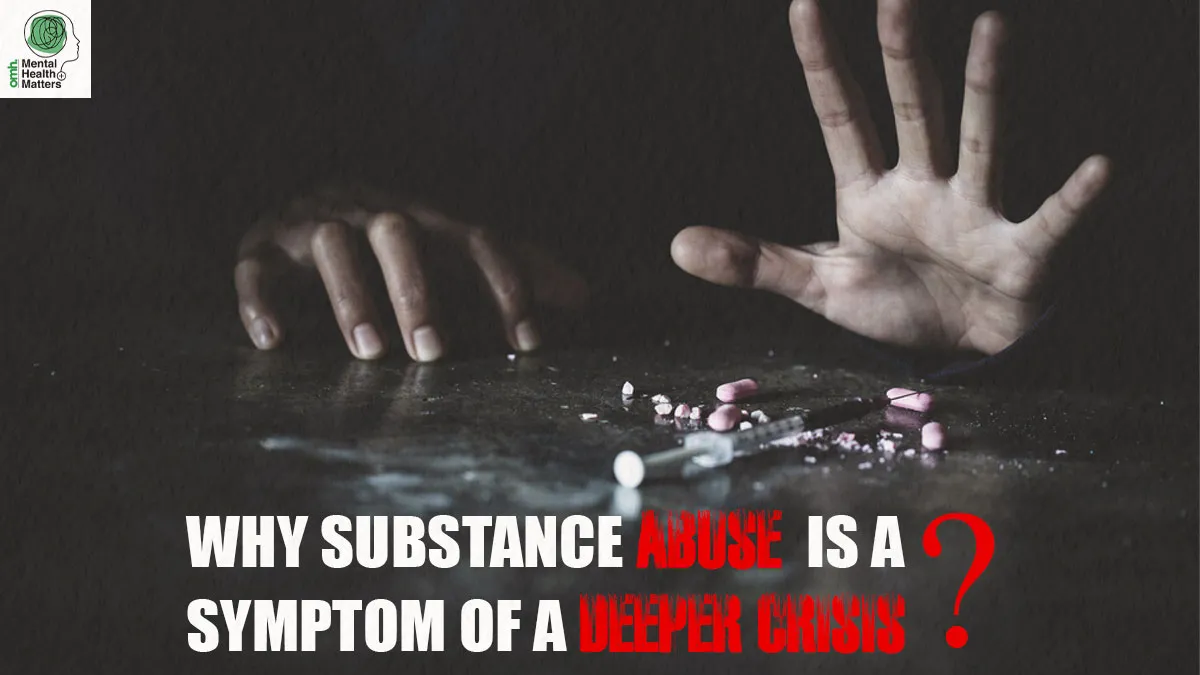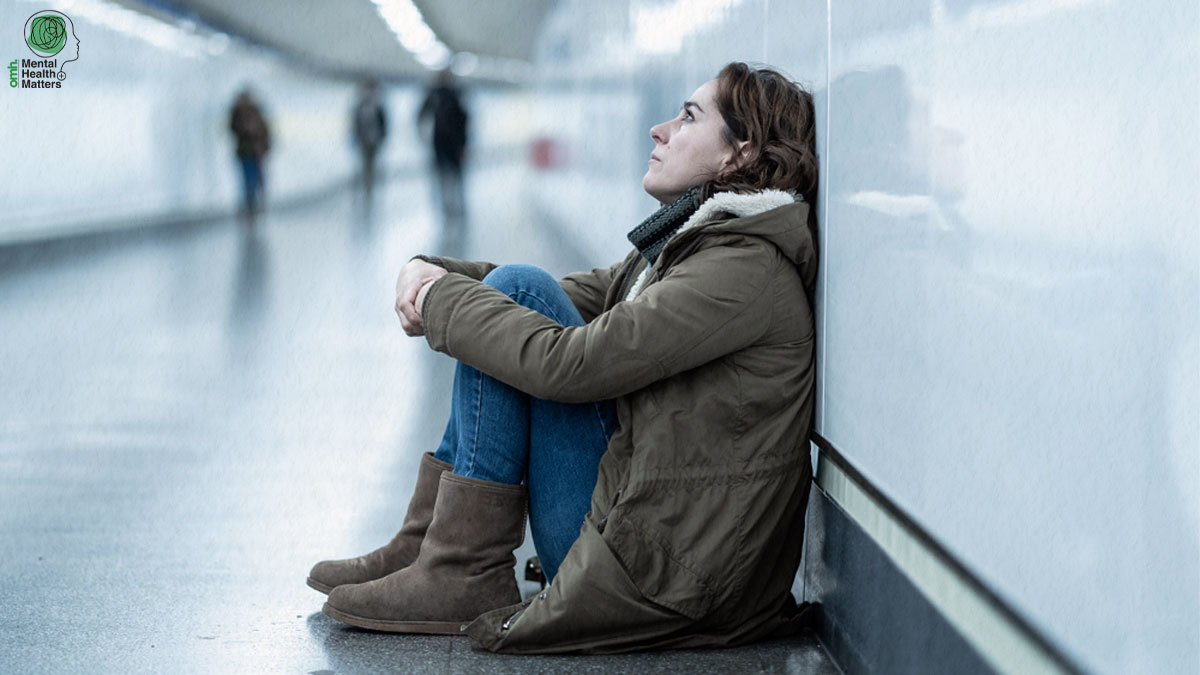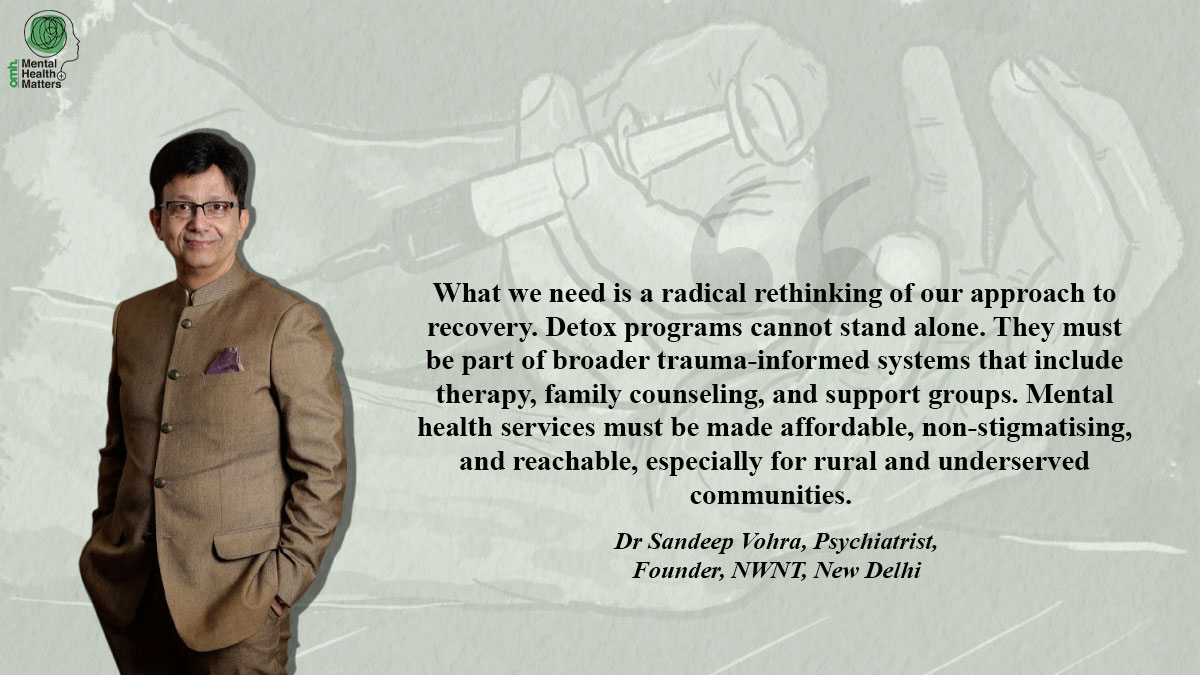
In clinics across India, the immediate response to substance use is predictably clinical: stop the drinking and detox the system. While this remains a medically necessary step, it often misses the larger picture. Addiction, more often than not, is not the disease itself, it is a symptom. A symptom of chronic emotional pain, untreated trauma, and broader systemic failure. It is the manifestation of invisible struggles that find no other outlet.
Table of Content:-
CHECK YOUR
MENTAL HEALTH

This week, in our "Mental Health Matters", on the occasion of International Day Against Drug Abuse, we spoke to Dr Sandeep Vohra, Psychiatrist, Founder, NWNT, New Delhi, who explained substance abuse and its implications on your mental health.
Addiction as a Coping Strategy, Not a Crime

Addiction is not about weak will or flawed character. It's often the only available solution to the body and mind when healthy options for processing pain are missing. "Neuroscience shows us that trauma and stress alter the brain’s reward systems, dulling natural feelings of joy or calm, and making drugs or alcohol seem like the only route back to 'normal.' Sometimes, people turn to substances not to feel high, but simply to feel something, anything, or tragically, nothing at all," explained Dr Vohra.
The Role of Stigma and Silence
The stigma surrounding mental health in India further deepens the crisis. Families still urge silence: “Be strong.” “Don’t talk about it.” In this environment, emotions go unprocessed and pain becomes internalised. Those who cry out through substance use are often punished, shamed, or ignored instead of being helped. This cultural conditioning, particularly for men, has fostered what can only be called an emotional pressure cooker. In reality, the growing rates of addiction reveal not personal weakness, but a widespread social breakdown.
Recent studies support this. One in five Indian substance users suffers from a co-occurring mental health disorder, yet nearly 83% of them receive no treatment. A 2024 Kolkata-based study underscored this even further, revealing that adolescents under the crushing weight of academic pressure and emotionally unavailable homes are increasingly using substances as a coping mechanism, with many also reporting suicidal thoughts. These young people aren’t chasing highs; they are chasing relief from emotional lows that feel unbearable.
The Ground Reality
Consider Punjab’s opioid crisis. Between 2022 and 2024, the state recorded over 33,000 drug-related cases, including 144 overdose deaths in 2023 alone, reportedly the highezst in India that year. Nearly a million individuals are on long-term opioid substitution therapy, yet many remain indefinitely dependent on drugs like buprenorphine without sufficient psychosocial support to taper off. In Jharkhand, despite poppy destruction efforts over 27,000 acres, the amount of brown sugar seized skyrocketed from 1.3 kg in 2023 to 12.2 kg in 2024. These numbers are more than just statistics; they are red flags revealing the extent of unaddressed demand and community despair.
We’re not only dealing with narcotics. Alcohol-related hospitalisations in Andhra Pradesh have increased significantly since 2019, and India continues to face the burden of tobacco addiction, where over 20 million children aged 10–14 are already addicted. Each day, about 5,500 new young users are added to this list, even as public awareness efforts continue. The scope of the problem has moved beyond individual addictions to a broader public health emergency.
A Broken Mental Health System
Mental health facilities are grossly underdeveloped. Punjab, for example, has a paltry 0.07 mental health professionals per 100,000 population, when the World Health Organization suggests a minimum of 3. At the national level, India's contribution to mental health is only 0.05% of its overall health budget, and it still falls far behind the crisis before our eyes. The result? In 2022, India saw 170,924 suicides, which was an increase of 4.2% from the year before. In 2021 alone, 10,560 suicides were linked directly to alcohol or drug addiction, nearly triple the number recorded in 2011.
A Small but Significant Shift
Yet amidst the crisis, there are signs of awakening. Men, traditionally discouraged from expressing vulnerability, are increasingly seeking help. Between 2020 and 2024, calls to mental health helplines from men rose by 126%. This shift, while small, signals a cultural change that we must nurture, not ignore.
What Recovery Looks Like

What we need is a radical rethinking of our approach to recovery. Detox programs cannot stand alone. They must be part of broader trauma-informed systems that include therapy, family counselling, and support groups.
- Mental health services must be made affordable, non-stigmatising, and reachable, especially for rural and underserved communities.
- Schools must introduce emotional education early on, so children learn how to identify, express, and regulate feelings before substances become their outlet.
- Emotional resilience should be treated as vital a skill as reading and math.
From Fear to Compassion: Changing the Narrative
"Moreover, public messaging must move from fear-based narratives to compassionate ones. Asking someone “What are you running from?” instead of “Why are you like this?” could make all the difference. The policy must reflect this empathy too: harm reduction, accessible treatment options, and oversight of prescription drugs should be the normal, not punishment and shame," said Dr Vohra.
In the end, healing from addiction is not about sheer willpower. It’s about reimagining a life where people don’t need substances to feel whole. It means offering safety, belonging, and community instead of isolation. It means asking better questions, not just about what someone has used, but what they’ve survived.
India’s addiction crisis will not be resolved by de-addiction centres alone. It will be resolved when we treat addiction not merely as a chemical problem, but as a deeply human one, rooted in pain, sustained by neglect, and solvable only through care. The road to recovery doesn’t begin with abstinence, it begins with compassion.
[Disclaimer: This article contains information provided by an expert and is for informational purposes only. Hence, we advise you to consult your professional if you are dealing with any health issue to avoid complications.]
Also watch this video
How we keep this article up to date:
We work with experts and keep a close eye on the latest in health and wellness. Whenever there is a new research or helpful information, we update our articles with accurate and useful advice.
Current Version
